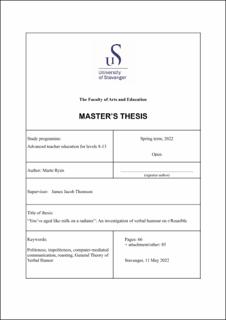“You’ve aged like milk on a radiator”: An investigation of verbal humour on r/RoastMe
Master thesis
Permanent lenke
https://hdl.handle.net/11250/3004279Utgivelsesdato
2022Metadata
Vis full innførselSamlinger
- Student papers (HF-IKS) [905]
Sammendrag
This thesis aims to investigate the phenomenon of “roasting” on an internet forum called r/RoastMe. The analysis is based on politeness theory (Brown & Levinson, 1987; Grice, 1975), impoliteness theory (Culpeper, 1996), The General Theory of Verbal Humor (Attardo, 1994; Ruch, Attardo & Raskin, 1993), and computer-mediated communication (Thurlow, Lengel & Tomic, 2004; Newhagen & Rafaeli, 1996). This thesis contributes to the existing pools of studies that have investigated other aspects of the r/RoastMe subreddit (Dynel, 2021; Dynel & Poppi, 2019; Kasunic & Kaufman, 2018; Poppi & Dynel, 2020).The aim of the study is to investigate how humour is created in the comments made on r/RoastMe by collecting 33 posts and 165 comments. This is done by adapting the General Theory of Verbal Humour to the format of the subreddit and applying it to an analysis of the comments on the page. Subcategories of the knowledge resources that belong to the General Theory of Verbal Humour are taken from the field of pragmatics, and from a pilot study.The key findings include that there are many knowledge resources that users draw on to create humour. One of the resources that is commonly used is the communicative context in which a roast is made. Other linguistic features (like word play) are rarely used. The roasts rely on the given information of the post to supply the “setup”, while the roasts form the punchline. This “setup” and “punchline” interaction demonstrates the highly dialogic nature of the forum.While “banter”, which involves teasing someone in a friendly manner, typically occurs between friends, the subreddit’s community seems to create a sense of closeness between users. Even though users may not know one another outside the forum, the fixed format of the subreddit and the shared practices among the users creates an arena where users are able to breach politeness conventions. It also appears that the roasts may be built in a certain order, similar to the hierarchy of Knowledge Resources (Ruch, Attardo & Raskin, 1993).
